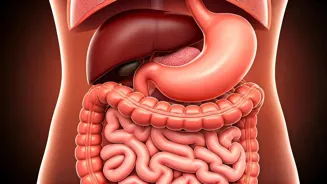Altitude's Impact on Digestion
At higher altitudes, cabin pressure drops significantly. This decrease in pressure causes gases within your body, especially in the digestive tract, to
expand. Imagine inflating a balloon: the higher you go, the bigger it gets. Similarly, the gases in your gut, which are already present from digestion and swallowed air, expand. This expansion is the primary reason for bloating. Moreover, the lack of humidity in airplane cabins contributes to dehydration, which also slows down digestion. Furthermore, restricted movement during a flight can also hinder the natural process of digestion, exacerbating the feeling of being full and uncomfortable. The combination of these factors makes jet belly a common experience for many travelers.
Dietary Strategies for Flights
What you eat and drink before and during your flight can significantly affect your comfort. High-fiber foods, while healthy, can produce more gas, which can worsen bloating. Similarly, carbonated drinks and processed foods should be avoided. Instead, opt for easily digestible foods such as lean proteins and complex carbohydrates. Staying hydrated is crucial; drinking plenty of water helps combat dehydration, and can promote efficient digestion. Avoid excessive alcohol and caffeine, as they can dehydrate you. Consider packing your own healthy snacks to control what you consume. Small, frequent meals are often better than large ones, aiding digestion and preventing overeating. Additionally, limiting sodium intake can prevent water retention, reducing the feeling of being bloated during your flight.
In-Flight Strategies and Exercises
Staying active during a long flight can assist with digestive health. Get up and walk around the cabin periodically to stimulate circulation and encourage movement in your digestive system. Performing gentle stretches while seated can also help. Consider focusing on stretches that involve your abdomen. Deep breathing exercises can help calm your nervous system, which can indirectly aid digestion. Avoid crossing your legs, as this can restrict blood flow and possibly affect digestion. Wearing loose-fitting clothing further contributes to in-flight comfort. If your flight is long, consider the use of compression socks to help maintain circulation. These steps promote comfort and reduce the likelihood of symptoms such as jet belly, creating a more pleasant and less uncomfortable experience during your trip.
Post-Flight Recovery Tips
Even with careful preparation, you might still experience some discomfort after a flight. After landing, allow your body to adjust to normal atmospheric pressure. Drink plenty of water to rehydrate. Engage in gentle exercise, such as a walk, to aid digestion and encourage blood flow. Consume foods that have a natural digestive effect, like ginger or peppermint, which can alleviate bloating. If the discomfort is considerable, consider over-the-counter remedies such as simethicone to relieve gas. Avoid heavy meals immediately after your flight, and choose lighter options to reduce digestive strain. Listen to your body and rest if needed. By taking these steps, you can hasten your recovery and return to your normal routine promptly, making the most of your travel experience.















